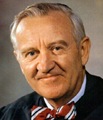 Ars Technica has a profile of retiring Supreme Court Justice John Paul Stevens that makes for interesting reading. Although most of it may not be relevant to e-book readers, the article does mention a few particularly important decisions to the tech world that were decided in large part thanks to Stevens breaking a tie.
Ars Technica has a profile of retiring Supreme Court Justice John Paul Stevens that makes for interesting reading. Although most of it may not be relevant to e-book readers, the article does mention a few particularly important decisions to the tech world that were decided in large part thanks to Stevens breaking a tie.
One of these is the seminal Sony v. Universal case that decided the legality of VCRs and declared “time shifting” to be a fair use of copyrighted media. It was Stevens who decided the 5-4 majority, and who wrote the majority opinion.
This case laid the groundwork for an appeals court to decide RIAA v. Diamond Multimedia in favor of allowing MP3 players and “space shifting”—which later led to the iPod, and then the iPhone and iPod Touch, one of the best platforms for e-book reading for those who don’t mind small screen size.
And in evolving the “substantial non-infringing use” doctrine, it enabled the development of a whole host of other innovative new devices (such as e-book readers in general) that could be used for copyright infringement (for instance, an e-book reader could be loaded with illegally-downloaded scans of commercial books) but are legal because they also have a lot of uses that don’t infringe.
Stevens was very much a friend to technology, and probably the most tech-savvy justice on the Supreme Court. “Indeed, a Supreme Court clerk who served during the debate over the Communications Decency Act told USA Today that Justice Stevens was at that time an avid email user and ‘was at least as computer-savvy as [his clerks] were.’”
As an avowed technophile myself, I must say it’s sad to see him go. But at 90 years old, the man has definitely earned his retirement.

































This article makes me wish Senators would query US Supreme Court nominee Kagan abt her knowledge of, and thinking abt, technology and information.
This also puts aside all the “singularity and supremacy of the free markets” arguments. Society, and the state that represents it, is always involved, in many forms, with economies and information access.